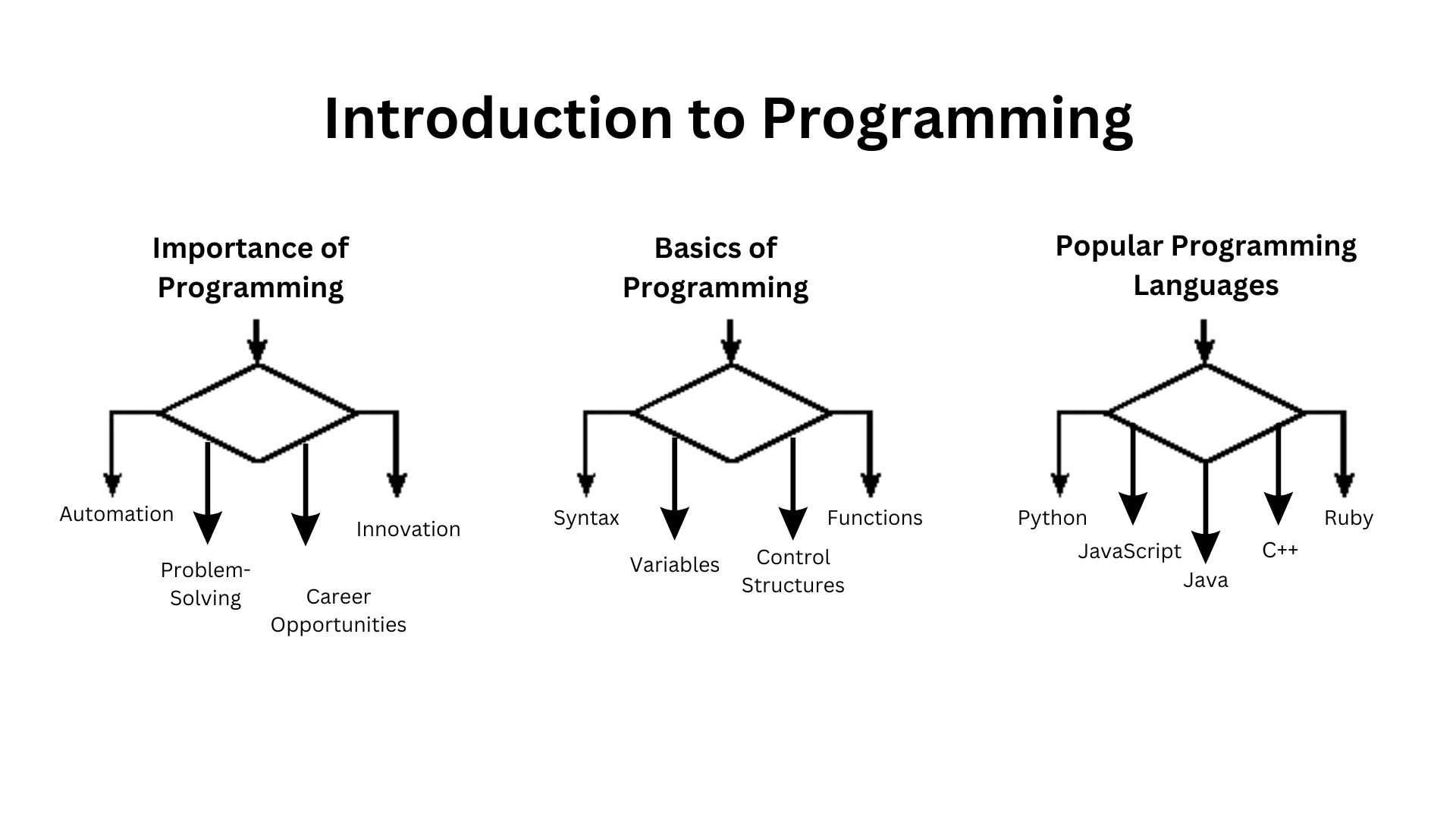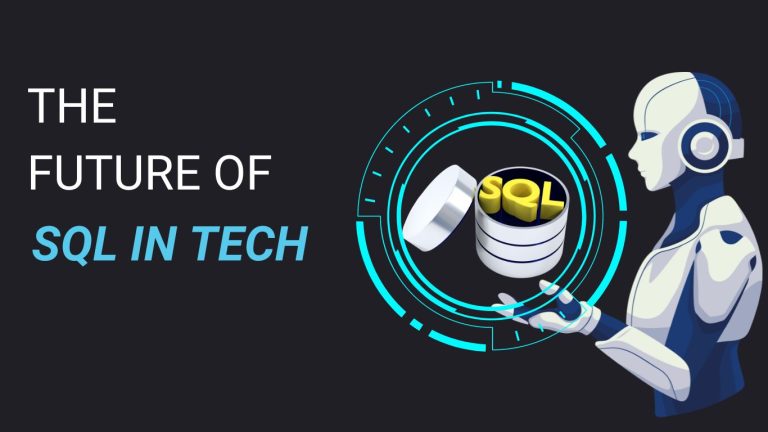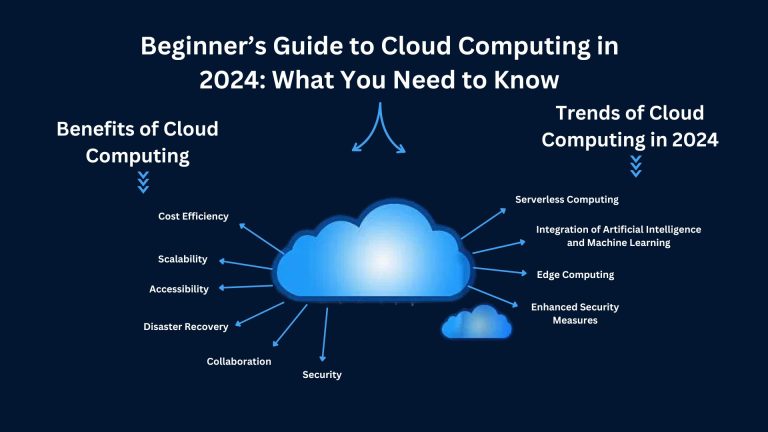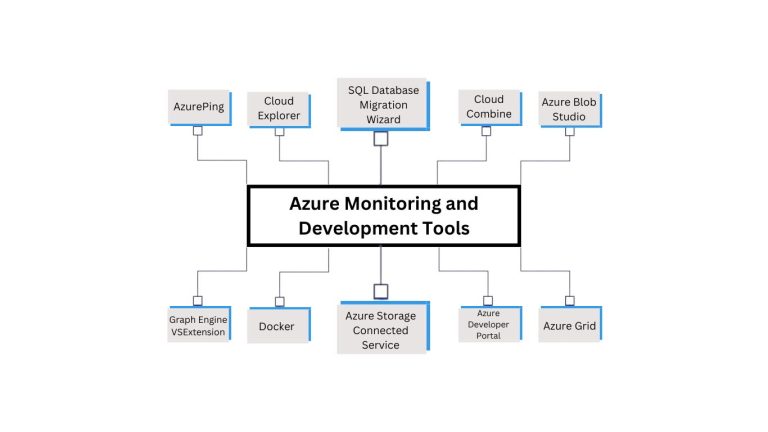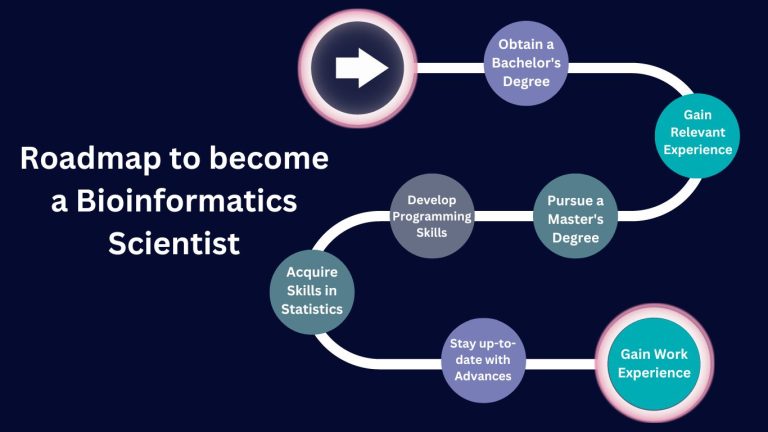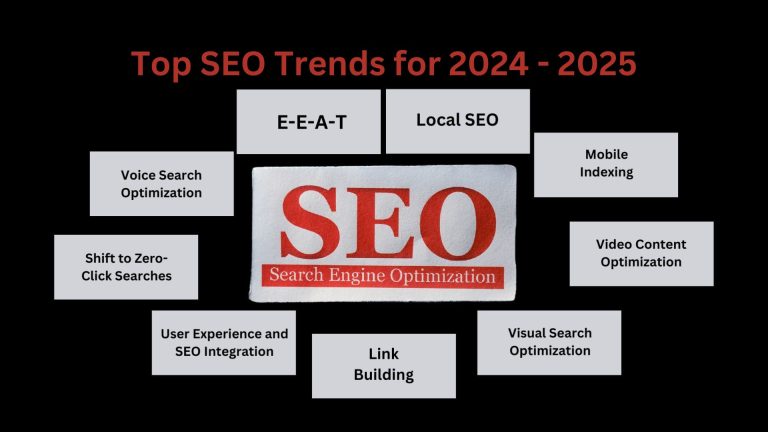Introduction to Programming : A Beginner’s Guide to Coding and Problem Solving
In this introduction to programming, you’ll get a hands-on understanding of the basics of coding, while also learning how to manage datasets and use databases Computer programming is an important skill to learn technological advancement.
It is the process of providing instructions to computers for the completion of certain tasks, and it is the foundation of “software engineering”, “website designing”, “data analysis”, “machine learning”, and other related disciplines.
This article will give the reader good background information on programming including the basics of programming, the significance, and how to start programming.
Introduction to Programming
What is Programming?
It is also known as coding which involves creating code that outlines a series of instructions for a computer to follow to address a definite difficult. These are written in programming languages, which are special languages that programmers use to give instructions to computers.
Importance of Programming
Automation
Programming helps reduce the workload and time taken to do a particular task by automating it.
Problem-Solving
It also enables one to develop critical thinking skills since most programs require one to solve problems by compartmentalizing them.
Career Opportunities
Computer programming fluency provides extensive job prospects in different fields such as information technology, banking and finance, health care and many others.
Innovation
It is the core of developments in technology and encompasses the creation of AI, machine learning, robotics and other emerging technologies.
Basics of Programming
Syntax: Syntax refers to the rules of the language, and every programming language has this; it defines what is accepted as a correctly structured program in that language.
Variables: A variable is a data item that can be manipulated by the program and the data stored in it can be accessed.
Control Structures: These are loops; “for” and “while” and “conditionals”; “if” and “else”.
Functions: Functions are blocks of code that are used to do a particular task and can be used any number of times.
Getting Started with Programming
- Choose a Language: Newcomers are encouraged to start with a language that is easy to learn such as Python because of its simplicity and the availability of many people who can help out.
- Online Resources: Use web resources such as Techprofree , Codecademy, Coursera and Khan Academy to find tutorials and courses.
- Practice: Learn programming, build your portfolio and begin with simple projects and then move up to the challenging ones.
- Join a Community: Interact with other learners and other experienced programmers via forums, coding boot camps and local meetups.
Programming Paradigms
Programming paradigms are different ways or approaches to programming. These paradigms provide diverse possibilities for categorizing and arranging code to make it more effective for certain/specific purposes (needs).
Procedural Programming
This paradigm involves writing down sequences of instructions to tell the computer what to do at every stage. It is based on the procedure calls which mean that the code is divided into functions. “C” is one of the best examples of procedural language.
Object-Oriented Programming (OOP)
In OOP, data is required to be grouped into objects that are based on the classes that come with data as well as functions. It is required for huge multi-programmed systems where code modularization and reusability are crucial. Some existing languages include Java, C++, and Python, few of which support OOP. This paradigm is especially useful when developing systems that replicate real-world artifacts or things.
Functional Programming
It defines computation as the calculation of mathematical functions and does not involve changing state as well as mutable data. Two of the functional programming languages most commonly used are Haskell and Scala, they are typically applied in applications that involve large volumes of data because stateless operations are beneficial in preventing and eliminating errors, and the program will not behave unpredictably.
Every problem is unique, and having several paradigms means that a programmer has all the tools he needs to solve a particular problem. For instance, while procedural programming can be used in creating simple scripts, OOP is used when creating larger applications that could be scaled and needed in different parts of an application.
Popular Programming Languages
- Python is an easy and quite universal programming language used in web development, data analysis and scripting.
- Crucial in web development, JavaScript is used to develop internet applications that are interactive and is compatible with all the current browsers.
- Java is a rock-solid object-oriented language used for developing business and Google’s Android applications.
- C++ is the upgraded version of C and is used for system/software development and game programming.
- Ruby is renowned for its simplicity and high productivity, making it a popular choice for web development, primarily through the “Ruby on Rails” framework.
10 Best Programming Languages
It is important and beneficial to know the key benefits of using each language when the specific needs are embedded in certain tasks. Python versatility corresponds to JavaScript, which is used for dynamic web pages; C++ for performance enhancement; and R for data analysis recounting the reasons why each language meets various needs in software development namely; web development, data science and enterprise systems among others.
Here is a brief list of the most popular programming languages that every developer should know, along with brief definitions to help you find the right language for your projects or personal growth.
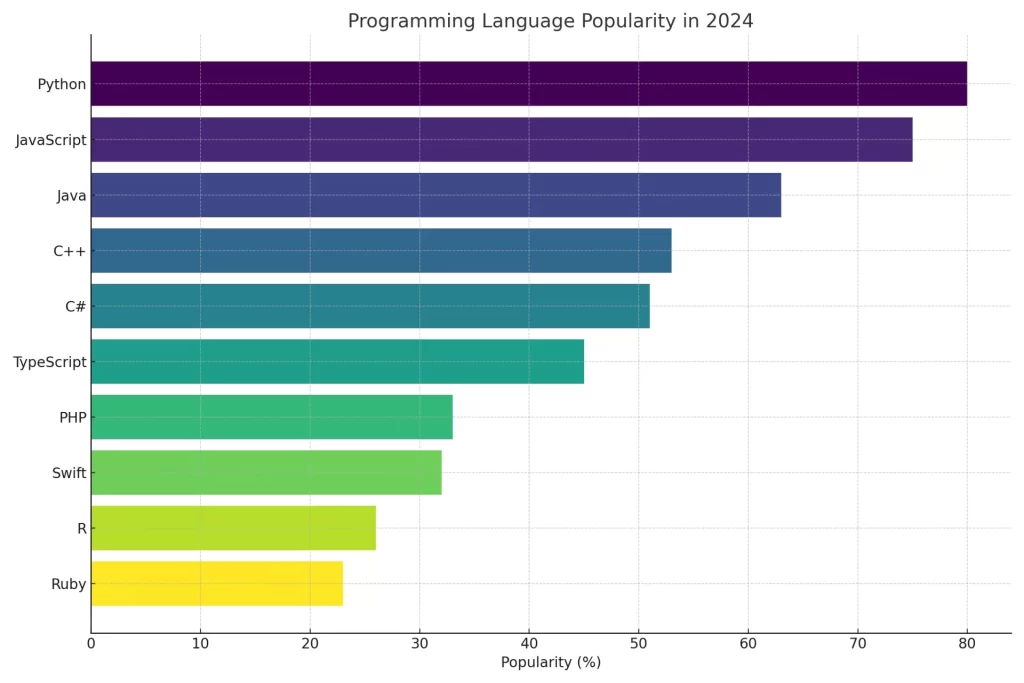
1 – Python
Python is a multipurpose language that is easily readable and also has extensive library commands. It is simple and very common and is applied in web development, data analysis and scripting. It has found its applications in data science, machine learning, and web development and is very easy to learn and use since it comes with in-built libraries and many organizations across various fields have incorporated the use of this programming algorithm.
10 Best Programming Languages
1 – Python
2 – JavaScript
JavaScript is crucial in web development as it is applied to build websites with the elements of interactivity and is compatible with most popular browsers. Vital for the front end, JavaScript is also now used for server-side work through frameworks such as React and Node.js making full-stack development quite effective.
10 Best Programming Languages
2 – JavaScript
3 – Java
It is a well-established, platform-independent language widely utilized for enterprise software and Android development. Java is object-oriented and is very reliable, used in large systems and financial applications, and is the central language for Android systems.
10 Best Programming Languages
2 – Java
4 – C++
C++ is an upgraded version of C that enhances C language and provides straightforward direct memory management and high speed. It is helpful for systems programming, most games, and resource greedy tools. C++ is capable of flexibility and functionality and allows for code structures of procedural and object-oriented paradigms.
10 Best Programming Languages
4 – C++
5 – C#
C# is developed by Microsoft and is used in Windows applications and also in game development using Unity. This language is employed across web, mobile and desktop applications within the .NET framework ecosystem. C# is particularly well suited to applications developed within the Microsoft environment because of its solid framework and adaptability.
10 Best Programming Languages
5 – C#
6 – Ruby
10 Best Programming Languages
6 – Ruby
It (Ruby) is a versatile language known for its ease of learning and straightforward syntax. It’s mainly used in web development with the Rails Framework. Ruby is considered a very simple and productive language for web development especially using Ruby on Rails. This language is more about how many lines of code and how they follow conventions rather than how to configure them for web applications.
7 – PHP
PHP is a server-side scripting programming language. Very popular for running WordPress and many other content management systems, it is used for backend scripting, working with servers, and making dynamic web pages.
10 Best Programming Languages
7 – PHP
8 – Swift
This programming language is Apple’s language for creating applications for iOS and macOS, which has a modern syntax and safety measures. Mainly designed to work best within Apple’s environment, it enables the fast and easy creation of applications for iPhones, iPads and Macs.
10 Best Programming Languages
8 – Swift
9 – TypeScript
TypeScript is JavaScript’s syntactic extension with the addition of static typing. It can be especially valuable in substantial web applications. With advances in functionality and especially the ability to scale and maintain JavaScript, TypeScript has become a popular language for intricate web applications.
10 Best Programming Languages
9 – Typescript
10 – R
“R” programming language is very important for fields that use a lot of data analysis since it has comprehensive libraries to manage the data. It is aimed and designed for statistical computation and data plotting. R is used in research projects and data analysis procedures.
All these programming languages have their own advantages, compatibilities, specifications, and needs, and these are the reasons why they are used by many people in different sectors and developments.
10 Best Programming Languages
10 – R
Programming Career Pathways
Programming provides a key to numerous professions in various industries. Every path may contain subject-specific information and abilities as well as expertise in specific programming languages.
Front-End Development
This encompasses designing the front end of websites and applications commonly referred to as the UI. HTML, CSS, and JavaScript stand for front-end development languages. It is suitable for people who like the design and construction of activities that involve user interaction.
Back-End Development
Back-end developers work on server-side logic, databases, and APIs. Languages like Python, Java, and Ruby are commonly used. This role involves giving attention to how applications work in the background.
Full-Stack Development
Full-stack developers are knowledgeable in both front and back end thus they are marketable since they can work in both areas.
Data Science
Coding is very important in data science especially since languages such as “Python” and “R” are used to compute data and build up machine learning algorithms. Data scientists are employed in various sectors including health, banking and finance among others, they analyze problems with the help of big data.
DevOps
DevOps is a combination of development and operations and mainly aims at automating the process of software delivery and infrastructure. Some of the different tools that DevOps engineers employ in enabling smooth deployments include “Docker”, “Kubernetes” and “Jenkins”.
Algorithms and Data Structures
Algorithm and data structure is an important area of programming and its mastery helps to solve different problems effectively.
An algorithm is a sequence of instructions created to solve problems and a data structure is a way of arranging data in order to facilitate the solutions of these problems.
This involves arranging data in a particular order, which is important in searching or data sorting activities such as quick and merge sort.
Data structures like one-dimensional arrays, two-dimensional arrays, linked lists, stacks, and queues help in managing data. Selecting an appropriate data structure makes a great deal of difference in terms of efficiency when dealing with large datasets.
Lists, stacks, and queues are less complicated structures than graphs, trees and hash tables and their common usage is in networking, gaming, web searching, etc.
Algorithms and data structures also provide a programmer with more solutions to a problem and also make him/her come up with more efficient solutions in terms of time and memory.
Security and Best Practices
Coding is an important part of programming. This involves making software secure and efficient, necessary factors in the modern world where a weakness can lead to hacking.
Code Optimization
Optimizing code means that the applications will consume less memory, and will run faster. High-performance computing means avoiding unnecessary calculations; using fast algorithms and minimizing inputs/outputs.
Secure Coding
Some of the risks that programmers should be well acquainted with include; SQL injection, cross-site scripting (XSS), and buffer overflows. Security measures like input validation, encryption, and error handling would go a long way in preventing these vulnerabilities.
Cybersecurity
Due to increased cases of cyber threats, the integration of security measures in software development cannot be an option or acceptable. Programmers should have an understanding of authentication, authorization and the storage of secure data.
The use of these practices makes it possible that the software being developed is usable and at the same time capable of protecting itself from an attack.
Conclusion
Programming is a useful skill that enables people to develop technological tools, manage processes and implement changes. It is also a basic skill, which makes people able to influence the further development of the Web space. Thus, following the principles of code and solving exercises, a person can begin a fruitful journey into the jurisdiction of software creation. By hard work and perseverance accompanied by training and education, one can open up a world of possibilities and be a valuable asset to the fast-growing technology industry.
FAQs
What is programming and why is it relevant?
Programming can be defined as the procedure that involves providing instructions for the execution of a program on a computer. It is used in the main operation of different technologies that exist in contemporary society ranging from simple websites to complex artificial intelligence systems. Another factor of its relevance is the occupation variety of this field in such sectors as software development, data science and robotics.
What language should a beginner learn?
Python is often suggested for newcomers because of its simplicity, versatility and extensive fan base of this programming language. It is most popular in website development, data analysis, and programming robots, so it is very useful for newcomers.
What basic programming concepts should a beginner learn?
For new learners, it is recommended that they focus on areas that include, syntax or the building blocks of the language, variables, conditional statements or loops, functions, and plain data structures like arrays or lists. Understanding these basics enables one to build a good background for learning other issues in programming.
How many years does it take to master programming?
Learning changes with time, and it is not uncommon for learners to take different amounts of time to master a particular language depending on several factors including interest, previous experience, and the language that is learned. While it may take quite a while to learn the basics, many people can master the essentials in a few months at most and achieve fluency in a year or more.
What is meant by front-end and back-end development?
Front-end development is concerned with the layout or the look of websites and applications and their interactivity while back-end development speaks to the back end of a site or application, including the server, databases and other frameworks upon which the front-end relies.
What is the role of debugging in programming?
Debugging is very important because it makes it possible to detect and fix any errors or bugs in the code that would hinder the proper running of the program. Debugging is an important activity in any software development project and it is the responsibility of all programmers.
What is the advantage of going through the concept of Object-oriented programming (OOP)?
OOP makes it easier to manage code by organizing it into objects and classes and makes it easier to scale the code and reuse it. It is used right from languages such as Java and Python and is especially applicable for use in large applications.
How does programming affect automation and innovation?
Programming is one of the primary tools used to automate processes and eliminate redundancy and human errors. It also spurs growth and helps individuals come up with new inventions that change the course of industries such as artificial intelligence, machine learning, and robotics that bring efficiency in productivity.
Learn About Future Trends

